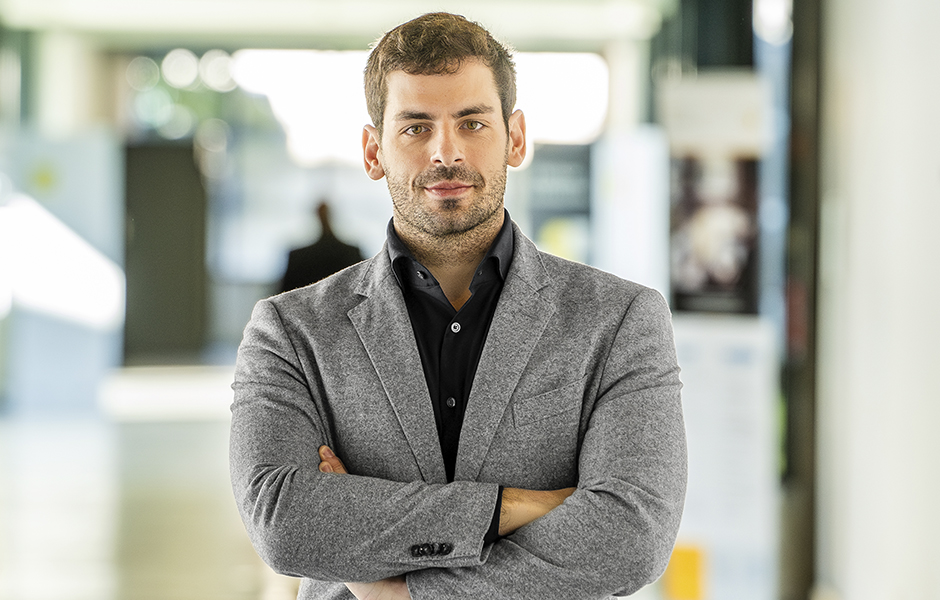Using Artificial Intelligence (AI) to improve digestive health and people’s quality of life is one of the main aims of Miguel Mascarenhas, a doctor, professor and researcher in the field of Gastroenterology.
At the age of 35, he chaired the international event AI in Digestive Healthcare: Shaping the Future, which took place on November 29, with the support of CINTESIS – Center for Health Technology and Services Research.
The initiative brought together hundreds of specialists at the Faculty of Medicine of the University of Porto (FMUP), the institution where Miguel Mascarenhas completed his Integrated Master’s Degree in Medicine and his PhD and where he is now a professor.
Currently, as well as being a professor at FMUP and a researcher at the RISE-Health Research Unit, Miguel Mascarenhas is a gastroenterologist at the ULS São João and CEO of the U.Porto spin-off DigestAID.
Driven by a naturally dreamy and entrepreneurial spirit, he has focused on exploring the truly transformative potential of Artificial Intelligence in health and in various areas of digestive care, with particularly promising applications in capsule endoscopy and high-resolution anoscopy.
As Miguel Mascarenhas points out, “AI is revolutionizing the way gastrointestinal diseases are diagnosed and monitored, enabling earlier and more accurate detection of lesions and conditions that might otherwise go unnoticed.”
Its path includes the development of innovative solutions that make it possible to identify tumors and cancer precursor lesions more effectively and more quickly, responding to the challenges of clinical practice.
For his work, he has already been honored twice with the award for best scientific work from the American College of Gastroenterology (2022 and 2024) and with the Banco Carregosa/Northern Regional Section of the Portuguese Medical Association (SRNOM) Award for his pioneering projects in the field of digestive health, in collaboration with leading institutions in several countries, such as the United States, Spain, France, Brazil and the United Kingdom.
– What is your 1-year ambition?
In the coming year, I propose to strategically expand the network of partner centers in the field of digestive health, promoting synergies that boost the sharing of specialized knowledge and the development of innovative solutions based on Artificial Intelligence. This effort aims not only to consolidate interdisciplinary collaboration, but also to stimulate translational research aligned with the real needs of clinical practice.
At the same time, I will devote attention to the creation of new disruptive technologies, as well as to the process of maturing and scientifically validating existing solutions, ensuring their robustness, effectiveness and practical applicability. This balance between innovation and technological consolidation will be fundamental to guaranteeing the clinical and scientific impact of the applications developed, promoting significant advances in the diagnostic and therapeutic approach to digestive pathologies.
– What is your 10-year ambition?
Over the next 10 years, I propose to consolidate a global network of centers of excellence in medical-surgical specialties, promoting strategic collaborations that drive the development and validation of Artificial Intelligence solutions with a solid and proven clinical impact.
The focus will be on obtaining regulatory approval for these innovative technologies and their effective integration into clinical practice, with the aim of revolutionizing medical care, making it more accurate, accessible and impactful. These tools will aim to provide earlier diagnosis and more effective therapeutic interventions, significantly reducing the burden of serious diseases and increasing patients’ quality of life.
This vision is guided by a deep humanitarian commitment, based on the conviction that technological innovation must be a vehicle for transformation that transcends the barriers of unequal access to health. The mission is clear: to contribute to a fairer and more efficient global health system, where technology serves not only to improve medical practices, but also to offer more humane and inclusive care, with a direct impact on the lives of those who need it most.
– How is life beyond research?
My free time is dedicated to the things that bring me balance and inspiration: reading about history, which helps me understand the present; practicing sport, for the ability to overcome and help each other; traveling, to get to know new cultures and perspectives; and, of course, being with my family, which makes every moment special.
Photo: FMUP/Miguel Matias

